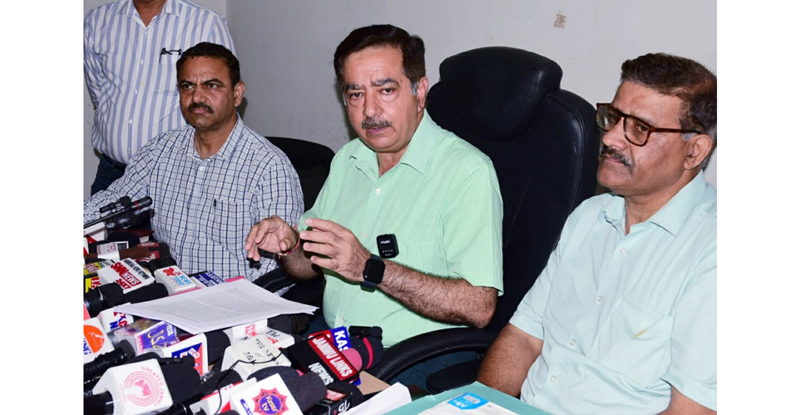*13.16 lakh households provided tap connections
Excelsior Correspondent
JAMMU, Oct 9: The Union Territory of Jammu & Kashmir (J&K) has made significant strides in improving access to clean water in rural households through Jal Jeevan Mission (JJM).
This was stated by Chief Engineer PHE Jammu Er Hamesh Manchanda, at a press conference in PWD Guest House, today.
The CE said that a remarkable 13.16 lakh out of 18.68 lakh rural households, representing 70%, now enjoy tap water connections, marking substantial progress towards achieving the mission’s goal.
“The mission aims to provide every rural household with a Functional Household Tap Connection (FHTC) within their premises, capable of delivering a minimum of 55 liters of water per capita per day while adhering to quality standards outlined in BIS 10500” he added.
He informed that in Jammu province alone, there are presently 1,782 ongoing schemes, encompassing a total of 4,401 individual works. Out of these, 4,035 works have been allotted to the contractors, and work has commenced on 3,020 of these projects. He added that 792 of these works have been successfully completed.
In pursuit of the mission’s goals, the construction of various infrastructure elements, including tube wells, bore wells, rapid sand filtration plants, overhead tanks, ground service reservoirs, and pipe networks have been initiated under the JJM initiative.
He said that over 1,000 contractors/agencies have partnered with the department for the execution of the aforementioned projects.
Speaking about the numerous challenges encountered during the project implementation under JJM, he said that all the challenges have been successfully addressed through expert consultations with teams operating at different levels, including District Level Project Management Units (DPMUs), UT-level consultant teams, and Third-Party Monitoring Agencies (TPIAs).
These solutions include the utilization of HDPE pipe distribution systems in specific locations and the incorporation of GRP water storage tanks. Additionally, the adoption of an efficient water boosting mechanism directly from primary storages (Sump tanks), has been employed in selected areas.
To maintain the quality of the supplied water, Jammu province has established a goal of testing 130,000 samples in the financial year 2023-24, he informed. He added that as of September 2023, a total of 64,000 samples have already undergone testing, distributed among 1 state lab, 10 district labs, and 33 Sub-Divisional labs. Additionally, 11 district laboratories are in the final stages of obtaining accreditation from National Accreditation Board for Testing and Calibration Laboratories (NABL).
Furthermore, around 32,000 women across all villages have been trained to use Field Testing Kits (FTKs) for water sample testing, with results reported on the WQMIS portal.
He said that J&K has earned the distinction of ranking 2nd nationally for its performance in water quality testing under the Water Quality Monitoring & Surveillance initiative.
With the accelerated pace of implementation over the past year, J&K remains steadfast in its commitment to ensuring drinking water security for all its rural residents for the next three decades, he added.


